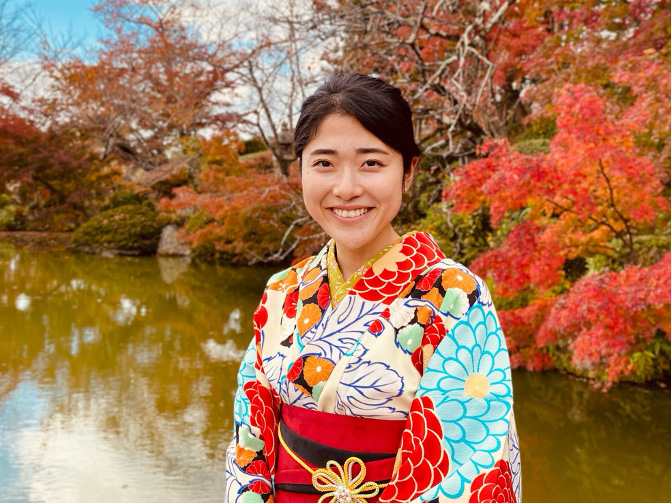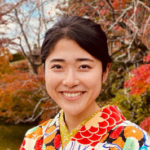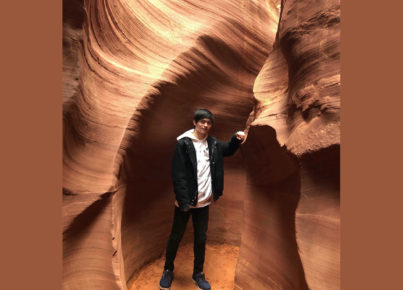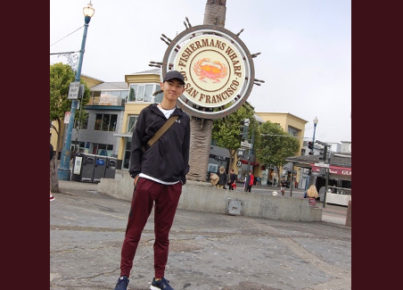“2020 A Year of Change”
Kokoro Osada
University student (Economics and Political Science)
Japan
2020 was a year of change, a year like no other. Over this epochal year, the unprecedented pandemic has forced us to dramatically change the way we work, live, and interact others. Most of us were confined in our homes for the first time, confused as Zoom meetings replaced most interactions we had and were discouraged by the daunting headlines that surrounded us every day. Just like any other individual striving to understand and cope with this situation, I found the past year extremely draining, also given the fact that 2020 had been one of the biggest turning points in my life. As a senior student I was a ‘shukatsu-sei’, the Japanese term referring to students engaging in job hunting activities. Working my way out under the constant pressure from hearing companies cutting down on their hiring positions had been a truly stressful experience. Being unable to reach out to my peers as easily as before and hence the loneliness magnified the anxiety of the experience. Luckily, I was blessed with many kind souls that supported me throughout the year, and was able to land myself a position at a Japanese trading and investment company, a job I had always admired even as a high school student participating in the 2015 TYCA program.
But to look on the bright side, the pandemic allowed me to take a breather, reflect on my life and mend over things I had simply rushed though. Having ample time to spend together as a family was something we had always been longing for, and there was no better way to do so than being quarantined together. Despite the restricted outlet, reaching out to my closest friends and sharing our thoughts also brought us together than ever before. Feeling overwhelmed by the constant, shifting flow of information around the virus, I became more aware of the importance of my physical and mental health, two things I often had little time to consider. After the first wave of COVID-19 gradually died down, I explored new hobbies with my family one of which was hiking, an eye-opening activity perfect for family bonding. In addition, the ‘Go To Travel campaign’, subsidies provided by the Japanese government to promote domestic travel and to boost local businesses, shifted the nation to explore our own backyard, and I too was one of many that were astounded to find the beautiful culture and nature our country had to offer. Despite the physical and emotional isolation we experienced, the unprecedent situation under COVID-19 allowed me to reevaluate the priorities in my life, and opened new doors to different activities I had never taken part in.
Speaker on much broader terms, the COVID-19 has also questioned and overturned conventional notions regarding sovereignty. Under urgent circumstances, the government’s respect for individual privacy and rights did not necessarily lead to an effective containment of the virus. As we have all observed in COVID-19 policies implemented in respective countries, certain levels of enforcement by the government were required to induce people to stay home against their will and keep the situation under control. Surveillance of the public by the government was often condemned and was deemed as an abuse of power. However, although leaving the question of to what extent such exercise of power should be tolerated, COVID-19 has somewhat ‘changed the game’ by proving that certain regimes have stronger endurance to emergency situations as such. In addition, the pandemic has left us challenges in the post-COVID era. Despite the increasing protectionist sentiment across the globe, international cooperation is called for like never before. Governments undoubtedly focus on domestic situations and put the welfare of their public first, hence restricting the exports of essentials such as food and medical supplies. Global economic activity is also at the risk of being brought to a halt with each country applying different quarantining measures of varying degrees. Xenophobic sentiment has also increased among countries as people wrongly seek an outlet for the stress and outrage against the consequences of the COVID-19. Furthermore, the economic situations are widening inequalities, forcing more people to food insecurity, and no access to adequate medical care. Even amidst the inclination to protectionism, it is crucial for nations to together coordinate the development and distribution of the vaccine, and to provide support for those that suffer from the dire circumstances. COVID-19 is what should bring us all together, to share the best of their technologies, unite against the pandemic and to prevent future breakouts of such viruses.
2020年は、他に類を見ない変化の年でした。この画期的な年に、前例のないパンデミックは、私たちの仕事や生活、そして他者との交流においての方法を劇的に変えてしまいました。ほぼ、全ての人たちが自宅に閉じこもる経験を初めてしました。Zoomが今までの対面での交流にとって代わり、私たちは混乱しました。ニュースでは心を落胆させるような見出しが毎日に渡って流れ、私たちは暗くなりました。状況を理解し、対処しようと努力している他の人と同じように、私もこの1年は非常に疲れました。それは、2020年が私の人生の中でも大きな転換期であるということを鑑みてもやはり、大変な一年でした。私は大学四年生なので「就活生」として活動していました。「就活生」とは日本語で、卒業後の就職を探している大学生を意味します。企業の採用人数削減というプレッシャーの中での就職活動は、本当にストレスの多いものでした。今までのように簡単に仲間と連絡を取ることができず、孤独感が不安を増幅させていました。幸いなことに、1年を通して多くの優しい人たちに支えられ、2015年のTYCAプログラムに参加していた高校生の頃から憧れていた日本の貿易投資会社に就職することができました。
しかし、明るい面を見てみると、パンデミックは一息ついたり、これまでの人生を振り返ったり、これまでにバタバタとこなしていたことを調整する時間を与えてくれました。家族として一緒に過ごす時間を十分に確保することは、私たちが常に切望していたことでした。皆一緒に家に隔離されるのならば、時間を共有することが最善策でしょう。外出制限はありましたが、親しい友人と連絡を取り合い、考えを共有することで、これまでにないほど友情が深まりました。絶えず移り変わる情報の流れに圧倒されていた私は、自分の身体と精神の健康の重要性に気づくようになりました。私は健康面に関してはこれまでに十分配慮をしてきていませんでした。COVID-19の第一波が徐々に収まった後、私は家族と一緒に新しい趣味を探究しました。その一つがハイキングで、家族の絆を深めるのに最適なアクティビティでした。また、日本政府が国内旅行を促進し、地元のビジネスを活性化するために補助金を支給した「Go to トラベルキャンペーン」を利用して、日本の奥深い場所を探索するようになりました。私もまた、日本にある美しい文化や自然に驚かされた一人でした。物理的にも精神的にも孤立していたにもかかわらず、COVID-19という前代未聞の状況は、自分の人生の優先順位を見直す機会を与えてくれて、今まで参加したことのない活動への新たな扉を開いてくれました。
もっと広い意味では、COVID-19はまた、独立国家の従来的概念に対して疑問を投げかけ、そして覆してきました。緊急の状況下では、政府が個人のプライバシーと権利を尊重することは、必ずしもウイルスを効果的に封じ込めることにはつながりませんでした。各国で実施されたCOVID-19の政策をよく見たところ、人々が望まなくても自分の家に留まるように誘導し、状況をコントロールし続けるためには、政府による一定のレベルの強制力が必要でした。政府による国民への監視はしばしば非難され、権力の濫用とみなされました。しかし、そのような権力の行使はどこまで許容されるべきかという疑問を残しつつも、COVID-19は、特定の政体が緊急事態に強いと証明することで、ある意味「事態を変えた」のです。
さらに、パンデミックは、コロナ後の課題を私たちに残しました。世界中で保護主義的な感情が高まっているにもかかわらず、国際的な協力がこれまでにないほど求められています。各国政府は間違いなく国内の状況を重視し、自国民の福祉を第一に考え、食料や医療品などの必需品の輸出を制限しています。世界の経済活動もまた、各国が程度の差こそあれ、さまざまな検疫措置を適用しているために停止に追い込まれる危険性があります。COVID-19に対するストレスや憤りを間違えた方向で吐き出そうとする人々の間では、排外主義的な感情も増加しています。さらに、経済状況は格差を拡大させ、より多くの人々が食糧不安に陥り、適切な医療へのアクセスができない事態に追い込まれています。保護主義に傾く中でも、各国が協力してワクチンの開発と配布を行い、悲惨な状況に苦しむ人々を支援することが重要です。COVID-19こそが、最高の技術を共有し、パンデミックに対して団結し、将来的なウイルスの発生を防ぐために、私たちが一丸となって取り組むべきものなのです。








